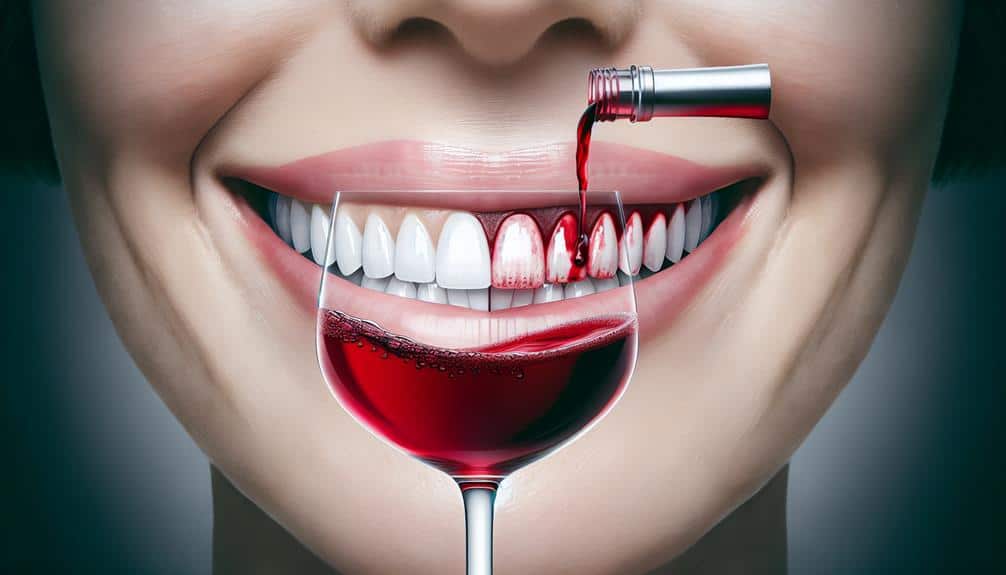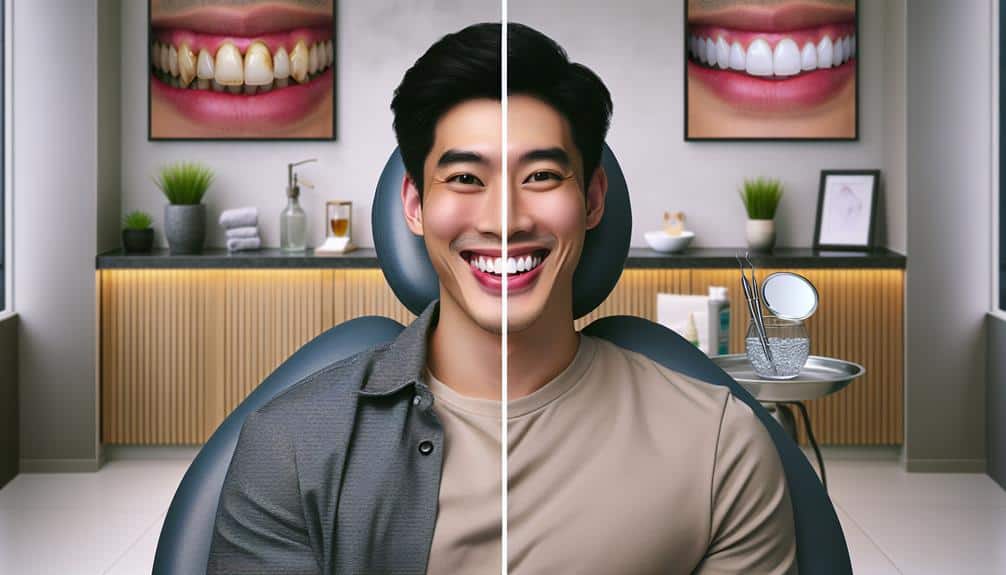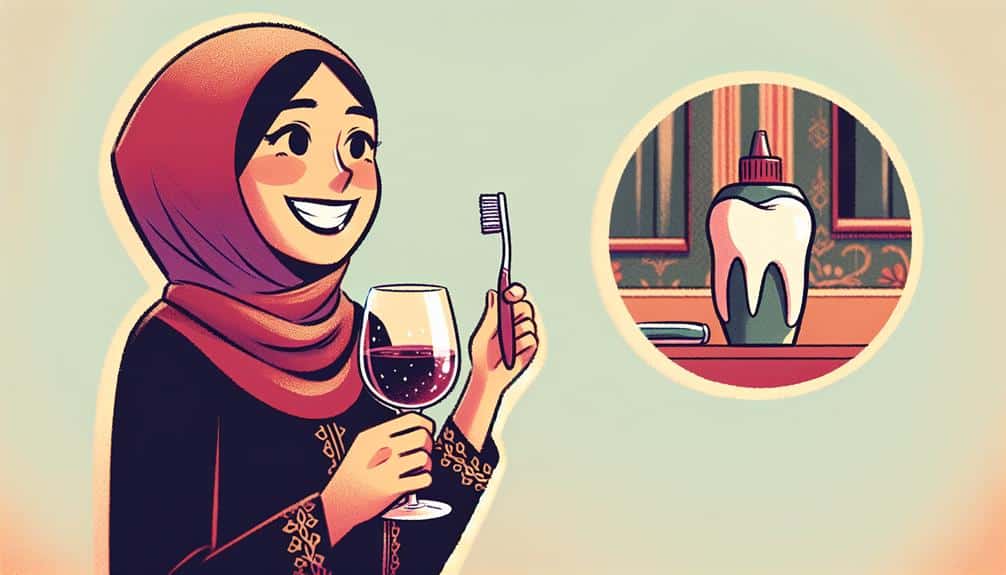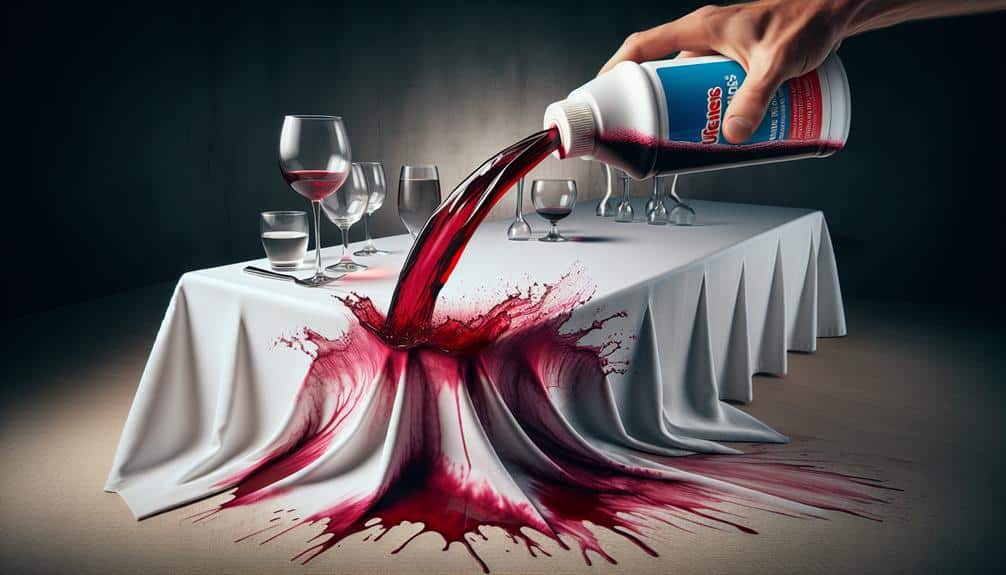To remove wine stains from your teeth: Try natural remedies like baking soda or activated charcoal. Make a paste with baking soda and water, then brush gently. Charcoal absorbs tannins causing stains; brush for a few minutes. Consider professional whitening treatments such as in-office procedures or take-home kits for quick results. Maintain a stain-free smile with daily oral hygiene and regular dental check-ups. Remember, a bright smile is within reach with these effective methods.
Key Points
- Use activated charcoal to absorb tannins causing stains.
- Try baking soda paste for mild abrasion on surface stains.
- Consider professional whitening treatments for effective stain removal.
- Maintain oral hygiene with daily brushing and flossing.
- Opt for in-office whitening or take-home kits for quick results.
Understanding Wine Stain Formation
When wine comes into contact with your teeth, it can lead to the formation of stubborn stains that are difficult to remove. Tooth discoloration caused by wine is a common issue due to its acidic nature and the presence of chromogens, which are intensely pigmented molecules. These compounds can adhere to the enamel, resulting in unsightly stains. To effectively address this, understanding stain removal techniques is vital.
Stain removal techniques vary in effectiveness and should be chosen based on the severity of the discoloration. Abrasive methods, such as professional dental cleanings or whitening toothpaste, can help eliminate surface stains. For deeper stains, professional whitening treatments or at-home whitening kits with hydrogen peroxide may be necessary. Consulting a dental professional to determine the most suitable approach for your specific case is crucial.
Preventing Wine Stains on Teeth
To prevent wine stains on teeth, implementing proactive measures can help maintain a bright smile and minimize the risk of discoloration caused by wine's acidic and pigmented properties.
One of the key preventive measures is to be mindful of your dietary habits. When consuming wine, consider using a straw to minimize contact between the wine and your teeth. Additionally, swishing water in your mouth after drinking wine can help wash away some of the pigments before they've a chance to stain your teeth.
Another effective preventive measure is to snack on crunchy fruits and vegetables like apples, carrots, or celery while enjoying your wine. These foods can help scrub away surface stains and promote saliva production, which aids in neutralizing acids and protecting teeth from discoloration.
Natural Remedies for Wine Stains
Consider using natural remedies such as baking soda or activated charcoal to help lift wine stains from your teeth. These DIY treatments are effective home solutions that can assist in removing stubborn wine stains.
Baking soda, known for its mild abrasive properties, can gently scrub away surface stains on teeth. Create a paste by mixing a small amount of baking soda with water and brush your teeth with it for a few minutes. Rinse thoroughly after.
Activated charcoal is another popular natural remedy for teeth whitening. It works by absorbing tannins, the compounds in wine that cause staining. You can use activated charcoal by wetting a toothbrush and dipping it into activated charcoal powder, then gently brushing your teeth for a couple of minutes before rinsing well.
Remember to use these remedies cautiously and not too frequently to avoid damaging your tooth enamel. Incorporating these simple yet effective natural methods into your oral care routine can help diminish wine stains on your teeth.
Professional Whitening Options
Explore professional whitening options for effectively removing wine stains from your teeth and achieving a brighter, stain-free smile. When considering cosmetic dentistry procedures to address wine stains, bleaching treatments are a popular choice. Here are some professional whitening options to help you achieve a radiant smile:
- In-Office Whitening: Dentists offer in-office whitening procedures that can greatly reduce wine stains in a single session. This option provides quick and noticeable results.
- Custom Take-Home Kits: Your dentist can create custom whitening trays for you to use at home. These kits are tailored to your teeth, ensuring even whitening and targeting wine stains effectively.
- Laser Teeth Whitening: This advanced whitening technique involves the use of laser technology to enhance the effects of whitening agents, effectively combating stubborn wine stains.
- Professional Whitening Strips: Dentists can provide professional-grade whitening strips that are more potent than over-the-counter options, offering a convenient way to address wine stains at home.
Maintaining a Stain-Free Smile
Maintain a stain-free smile by incorporating daily oral hygiene habits that help prevent discoloration and keep your teeth looking bright. Consistent brushing and flossing are essential in removing plaque and preventing stains from settling on your teeth. Make sure to brush at least twice a day with a fluoride toothpaste and floss daily to remove any food particles that can lead to discoloration.
In addition to daily hygiene practices, be mindful of your diet choices to maintain a bright smile. Avoid foods and drinks that are known to cause staining, such as coffee, tea, red wine, and dark-colored berries. If you do consume these beverages, consider using a straw to minimize contact with your teeth or rinse your mouth with water afterwards.
Regular dental check-ups and professional cleanings can also help prevent stains by removing any built-up plaque or tartar. By implementing these habits into your daily routine and being mindful of your diet choices, you can maintain a radiant, stain-free smile.
Frequently Asked Questions
Can Wine Stains on Teeth Cause Any Long-Term Damage to Tooth Enamel?
Wine stains on teeth can lead to long-term damage like enamel erosion. Protect your enamel by practicing good oral hygiene, opting for teeth whitening treatments, and preventing stains. Prioritize your dental health to maintain a bright smile.
Are There Any Specific Types of Wine That Are More Likely to Cause Stains on Teeth?
Certain wine types, particularly red wines like Cabernet Sauvignon and Malbec, contain pigments that can lead to teeth staining. To prevent this, consider opting for white wines or using a straw to minimize contact with your teeth.
How Soon After Consuming Wine Should One Try to Remove the Stains From Their Teeth?
For immediate stain removal, act swiftly post-wine consumption. Effective results are best achieved when addressing stains promptly. Embrace preventive measures like rinsing with water or brushing to care for your teeth after enjoying wine.
Can Frequent Consumption of Wine Lead to More Stubborn Stains on Teeth Over Time?
Frequent wine consumption can indeed lead to stubborn teeth stains over time. Preventive measures like reducing intake, proper dental hygiene, and tooth whitening treatments can help combat this. Dietary considerations also play a role in maintaining oral health.
Are There Any Specific Oral Health Issues That Could Make Someone More Susceptible to Wine Stains on Their Teeth?
Improving oral hygiene can reduce susceptibility to wine stains on teeth. Poor dental health, like enamel erosion or cavities, may make you more prone. Preventing staining involves regular brushing, flossing, and dental check-ups.



